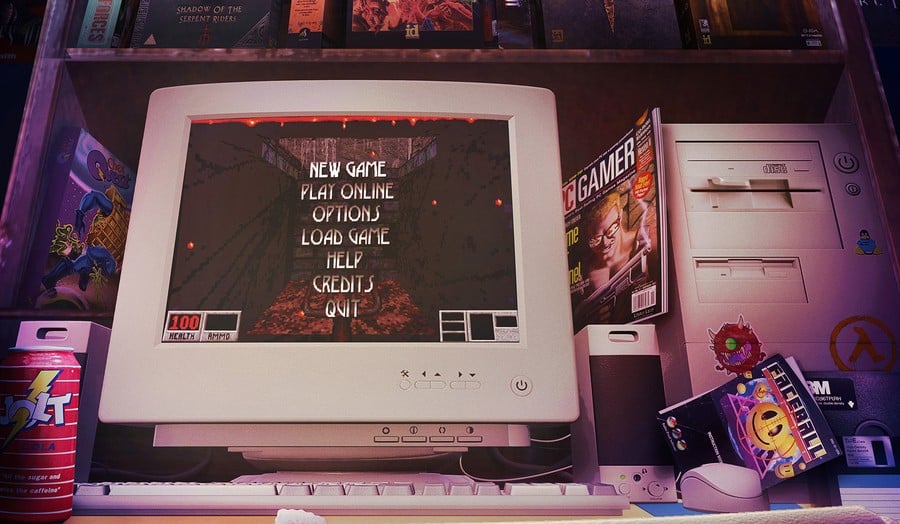
How do you go about summing up the entire history of the first-person shooter genre in just under five hours? Well, if the documentary "First Person Shooter: The Definitive FPS Documentary" is anything to go by, you can’t. But in the process, you can create something fairly close to that — an uneven yet fascinating trip through some of the genre's most pivotal moments.
Originally beginning life as a Kickstarter project in 2021 (before launching a separate campaign on IndieGoGo one year later), Fandamental's new documentary "First Person Shooter" is going on presale later today and will be going out to backers at the end of August. It is a four-and-a-half-hour deep dive into the iconic genre, covering over 50 games from early FPS games for computers, like Maze War and The Colony, to industry-defining shooters like Wolfenstein 3D, Doom, and Half-Life.
Over its frankly bum-numbingly long runtime, it is packed with an impressive 40+ interviews with legendary developers, journalists, content creators, and professional gamers, with some of the stand-outs being John Romero (Wolfenstein 3D, Doom, Doom II, Quake) John Carmack (Wolfenstein 3D, Doom, Doom II, Quake), Warren Spector (System Shock, Thief, Deus Ex), Marcus Lehto (Halo: Combat Evolved, Halo 2, Halo 3, Halo 3: ODST, and Halo Reach), Tom Hall (Wolfenstein 3D, Doom, and Rise of the Triad) and Scott Miller (Wolfenstein 3D, Rise of the Triad, and Duke Nukem 3D).
It's extraordinary the amount of effort the filmmakers have gone to here, with the film packed to the brim with a bunch of wonderful and often hilarious insights from across the decades. Want to know how John Romero's head ended up being in Doom II? Or how Dog Mode made it into Rise of the Triad? It's all covered here and with first-hand accounts to boot. The documentary even goes beyond just covering the most famous titles too, dedicating some time to revisiting Dreamworks Interactive's infamous Jurassic Park title Trespasser, and Dynamix's overlooked Starsiege: Tribes.
Yet, for all its marvelous access and spectacular research on display, what the documentary seems to lack is a decent structure to hang this all on or a clear idea of how it wants to present its story.
The documentary uses the conceit of a wall of games to guide the player through the genre's long and complicated history, with the camera closing in on the box art of whichever title it intends to tackle next. For the first half of the documentary, this approach works fairly well, with most of the entries being addressed in a near-chronological fashion. However, this more linear approach eventually goes out the window later on, with the filmmakers finding themselves flicking backward and forwards through time, to revisit threads that were teased sometimes hours before.
For instance, GoldenEye 007 is covered just over 2 hrs in, but it takes another hour before Turok: Dinosaur Hunter (another game that found a following on N64) is even mentioned. This feels like a strange editing decision, especially when you consider contemporary reviews of GoldenEye couldn't help but compare the two titles and how the pair were successfully bringing the FPS genre to consoles.
There are also a few games and subgenres too, which feel a bit short-changed here in comparison to others. Military FPSes, for example, like Medal Of Honor, Call of Duty, and Battlefield are only mentioned in the final half hour of the doc, with the documentary relying on pundits rather than the developers of the games themselves to give their thoughts.
None of this is to say that the documentary is disappointing, as it still manages to be an entertaining and insightful exploration of the genre. However, it's clear that the filmmakers have had an overwhelming task trying to wrestle all the different footage into a coherent structure and that certain kinds of games have had to take precedence over others to avoid the documentary's runtime ballooning even further.
Our final thoughts are that the documentary would have probably worked better as a docuseries instead, focusing on distinct companies or trends, but as it stands now, it is still worth diving into (if you have the money or time) for the sheer amount of incredible content on offer.
